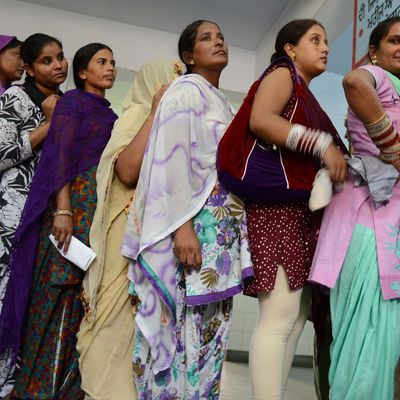
UNICEF estimates that 800 women die of pregnancy-related causes every day. Despite a decline in maternal mortality rates over the past few years, about a quarter of those are Indian women. Roughly 70 percent of India’s pregnant women live in rural areas, where access to doctors, monitoring equipment, and education is scarce. Technology, though, is not scarce; there are nearly a billion active phone subscribers in India. And that opens the door for some solutions.
SaveMom was founded in 2016 by Sunder Jagannathan and Senthil Kumar, two tech entrepreneurs from Bangalore, India. Jagannathan and Kumar wanted to help pregnant women solve four major problems: how often to see a doctor, how to alert a doctor during the day if necessary, how to remind patients to take medicine, and how to gauge their and their baby’s health at home.
They set to creating a sort of home-brewed smartwatch, capable of keeping appointments, monitoring heart rate, and dialing emergency services. This turned into a company, and eventually ended up winning some startup competitions — Facebook’s Code for the Next Billion among them.
SaveMom was initially going to be an app for urban women, but after getting involved in the space, the company realized that rural women vastly outnumber those in urban areas, and that their needs were, if anything, greater. According to the WHO, 66 percent of India’s 1.3 billion people lives in rural areas. About half of all pregnant Indian women have prenatal checkups fewer than four times during their entire pregnancy, according to a national survey. Going out in the field, the SaveMom team found that many rural women saw a doctor two times or fewer during their pregnancy.
So the SaveMom app, which is currently doing pilot tests and not yet available publicly, will have two different branches. One is SaveMom Premium, which features an updated version of that wearable device. It syncs with a mobile phone to set reminders for appointments, provide health information, track heart rate and physical activity, and store medical reports.
SaveMom Ahalya is the other branch, designed specifically for rural areas. Ahalya is a kit, almost like a first aid kit, of specially designed gadgets: a fetal heart-rate monitor, blood-pressure monitor, pulse oximeter (that’s the little clip the doctor puts on your finger while taking your blood pressure; it measures oxygen saturation in the blood), blood-glucose monitor, and a smart scale (which measures body fat, metabolic rate, and various other info).
The idea is that SaveMom will partner with local governments and NGOs to bring the Ahalya kit to smaller villages, where multiple patients can share them. They’ve already locked down some partners, including the state government of Karnataka and a nonprofit called Amrita SeRVe. Those organizations can send someone out to the villages with the kit and measure every pregnant woman quickly, with no expertise needed; the app walks through the basic steps of, you know, Velcro-ing the heart-rate monitor on the patient’s arm. If there’s internet connectivity, it’ll upload to the cloud right away; if not, it can be stored on a mobile device until it has connectivity.
“We went through a lot of WHO reports and we found that the problem was a lot bigger than we had imagined,” said SaveMom’s Divya Krishnan in an interview with the Bridge. “In rural areas, accessibility to healthcare is a major issue and so is the lack of awareness.” SaveMom’s team hopes that its ease of use, coupled with India’s impressive connectivity, can help address the issue.